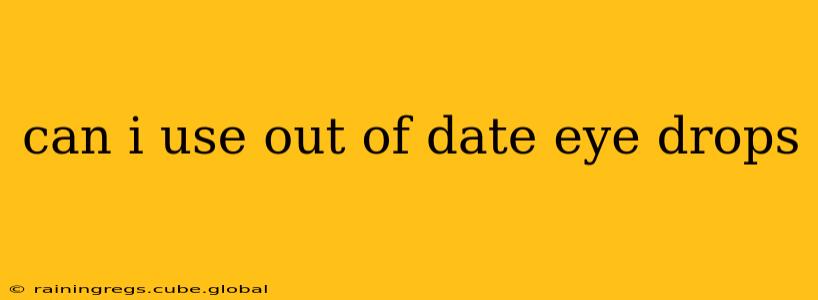Can I Use Out-of-Date Eye Drops?
Using expired eye drops is a risky proposition. While the immediate effects might not be catastrophic, using outdated eye drops significantly increases your chances of developing an eye infection or experiencing other unpleasant side effects. This article explores the risks and what to do with expired eye drops.
What Happens When Eye Drops Expire?
Eye drops, like many medications, have a shelf life. After the expiration date, the active ingredients can degrade, losing their effectiveness. This means the drops may not treat your eye condition as intended. More critically, the preservative in the eye drops, which prevents bacterial growth, also degrades over time. This leaves the solution vulnerable to contamination, increasing the risk of introducing bacteria or fungi into your eye.
What Are the Risks of Using Expired Eye Drops?
The risks associated with using expired eye drops are significant and shouldn't be ignored:
- Ineffective Treatment: The most obvious risk is that the medication won't work as intended, potentially worsening your eye condition.
- Eye Infection: Contaminated eye drops can easily introduce bacteria or fungi into your eye, leading to serious infections like conjunctivitis (pink eye), keratitis (corneal infection), or even more severe conditions requiring urgent medical attention. These infections can cause pain, redness, blurred vision, and potentially permanent damage.
- Allergic Reaction: Degraded ingredients can trigger allergic reactions, resulting in itching, redness, swelling, and discomfort.
How Long Are Eye Drops Good For After Opening?
The expiration date on the eye drop bottle refers to the product's shelf life before opening. Once opened, eye drops typically have a shorter usable lifespan, usually ranging from 2-4 weeks. Check the label on your specific bottle for the most accurate information. After this period, discard the eye drops, even if they haven't reached their printed expiration date.
What Should I Do With Expired Eye Drops?
Never reuse expired eye drops. Proper disposal is crucial to protect yourself and the environment. Check with your local waste disposal authority for instructions on how to dispose of medications safely. Many pharmacies offer take-back programs for unused or expired medications.
Can I Use Eye Drops That Are Slightly Past Their Expiration Date?
While some might be tempted to use eye drops that are slightly past their expiration date, it's strongly advised against it. Even a few days past the expiration date increases the risk of contamination and decreased effectiveness. The potential consequences of using expired eye drops far outweigh any perceived convenience.
How Can I Prevent Eye Drop Contamination?
Proper handling is vital to prevent contamination and maximize the shelf life of your eye drops:
- Wash your hands thoroughly before and after using eye drops.
- Avoid touching the tip of the dropper to your eye or any other surface.
- Store eye drops in a cool, dark place, away from direct sunlight and heat.
- Never share eye drops with others.
In conclusion, using out-of-date eye drops poses considerable risks to your eye health. Always adhere to the expiration date and discard them appropriately. If you have any concerns about your eye health, consult an ophthalmologist or optometrist.
